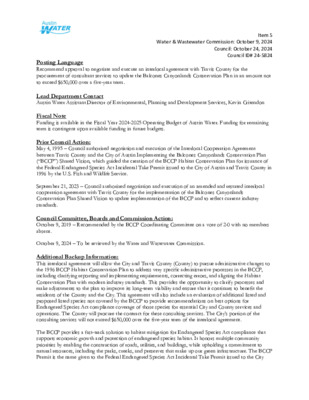Item 5 BCCP Interlocal — original pdf
Backup

..De Item 5 Water & Wastewater Commission: October 9, 2024 Council: October 24, 2024 Council ID# 24-5824 Posting Language ..Title Recommend approval to negotiate and execute an interlocal agreement with Travis County for the procurement of consultant services to update the Balcones Canyonlands Conservation Plan in an amount not to exceed $650,000 over a five-year term. Lead Department Contact Austin Water Assistant Director of Environmental, Planning and Development Services, Kevin Critendon Fiscal Note Funding is available in the Fiscal Year 2024-2025 Operating Budget of Austin Water. Funding for remaining term is contingent upon available funding in future budgets. Prior Council Action: May 4, 1995 – Council authorized negotiation and execution of the Interlocal Cooperation Agreement between Travis County and the City of Austin Implementing the Balcones Canyonlands Conservation Plan (“BCCP”) Shared Vision, which guided the creation of the BCCP Habitat Conservation Plan for issuance of the Federal Endangered Species Act Incidental Take Permit issued to the City of Austin and Travis County in 1996 by the U.S. Fish and Wildlife Service. September 21, 2023 – Council authorized negotiation and execution of an amended and restated interlocal cooperation agreement with Travis County for the implementation of the Balcones Canyonlands Conservation Plan Shared Vision to update implementation of the BCCP and to reflect current industry standards. Council Committee, Boards and Commission Action: October 9, 2019 – Recommended by the BCCP Coordinating Committee on a vote of 2-0 with no members absent. October 9, 2024 – To be reviewed by the Water and Wastewater Commission. Additional Backup Information: This interlocal agreement will allow the City and Travis County (County) to pursue administrative changes to the 1996 BCCP Habitat Conservation Plan to address very specific administrative processes in the BCCP, including clarifying reporting and implementing requirements, correcting errors, and aligning the Habitat Conservation Plan with modern industry standards. This provides the opportunity to clarify processes and make adjustments to the plan to improve its long-term viability and ensure that it continues to benefit the residents of the County and the City. This agreement will also include an evaluation of additional listed and proposed listed species not covered by the BCCP to provide recommendations on best options for Endangered Species Act compliance coverage of those species for essential City and County services and operations. The County will procure the contract for these consulting services. The City’s portion of the consulting services will not exceed $650,000 over the five-year term of the interlocal agreement. The BCCP provides a fast-track solution to habitat mitigation for Endangered Species Act compliance that supports economic growth and protection of endangered species habitat. It honors multiple community priorities by enabling the construction of roads, utilities, and buildings, while upholding a commitment to natural resources, including the parks, creeks, and preserves that make up our green infrastructure. The BCCP Permit is the name given to the Federal Endangered Species Act Incidental Take Permit issued to the City Item 5 Water & Wastewater Commission: October 9, 2024 Council: October 24, 2024 Council ID# 24-5824 and County in 1996 by the U.S. Fish and Wildlife Service, combined with the BCCP Habitat Conservation Plan, which is the governing document that established the Balcones Canyonlands Preserve (BCP). The permitting process for infrastructure projects and City-owned BCP lands are managed by Austin Water. Some tracts within the BCP system are City parks and are co-managed with the Parks and Recreation Department. In the more than 27 years since the BCCP was created, more than 1,200 private landowners and developers have applied for BCCP take permits, resulting in the development of over 17,100 acres and the authorization of more than 300 public infrastructure projects. The BCCP implementation to date has been a success. The City and County have nearly met, met, or exceeded almost all the required conservation actions, and have done so with substantially less impact on covered species habitat than predicted.